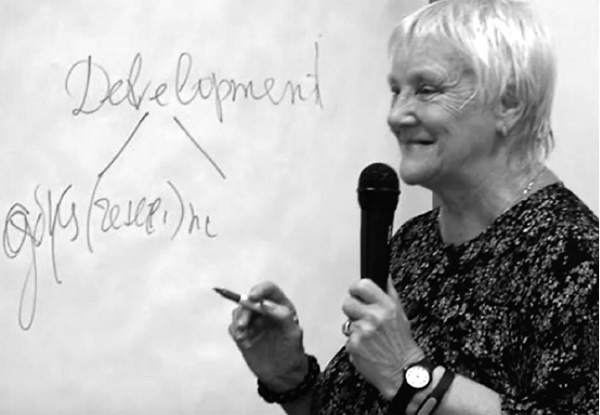Проблемы психического здоровья брошенных детей
Поступила: 19.06.2019
Принята к публикации: 23.06.2019
Дата публикации в журнале: 30.07.2019
Страницы: 46-47
DOI: 10.11621/npj.2019.0208
Ключевые слова: Л.Ф. Обухова; история психологии; Юбилей; детская клиническая психология
Доступно в on-line версии с: 30.01.2019
Обухова О.Б. (2019). Проблемы психического здоровья брошенных детей. Национальный психологический журнал, (2) , 46-47. https://doi.org/10.11621/npj.2019.0208
Скопировано в буфер обмена
СкопироватьАннотация
Тезисы выступления Л.Ф. Обуховой на VI Международной конференции по проблемам физической активности (Тайпей, Тайвань, 22 октября 2015)

Liudmila Obukhova is Full professor since 2005. She works in Lomonosov Moscow State University from 1960 till present time, in Moscow State University of Psychology and Education from 1997 till present time. Teaching areas: Child development; Aging psychology, developmental psychology; Foundations of general developmental psychology (Vygotsky, Piaget, Galperin); Mental development of blind and deaf-blind children and adolescents. Supervisor of more than 30 dissertations. Member of the International Society for Cultural and Activity Research (ISCAR), of World Organization for Early Children Education (OMEP). She participated in many Conferences and Seminars: 1st Swiss Russian Health Forum, Moscow, Russia, 2011; International congress of psychology dedicated to Vygotsky, Lisbon, Portugal, 2010; 20th EECERA annual conference “Knowledge and voice in early childhood: who knows, who speaks, who listens?”, Birmingham, UK, 2010; ISCAR Congress Rome, Italy, 2011; “Child in modern society”, Moscow, Russia, 2007; “Different childhood”, Moscow, Russia, 2009; “At the threshold of growing-up”, Moscow, Russia, 2011; “In the beginning of the mental development, Moscow, Russia, 2013; IAGG Congress, Seoul, 2013, and others. Main publications: The Stages of the child thinking development, 1972, 151 pp. (In Russian and in Japan) ; Theory of Piaget: pro and contra, 1981, 191 pp.; Child psychology: theories, facts and problems, 1995, 357 pp.; Forms and functions of imitation in childhood (with I.Schapovalenko), 1994, 109 pp.; The development of divergent thinking (with S.Churbanova), 1995, 79 pp; Family and child: psychological aspect of child development (with O. Schagraeva), 1999, 167 pp.; J.Piaget: Theory, experiments, discussions (with G.Burmenskay compiler, editor and author of articles), 2001; Developmental psychology. 4ed, 2014 460 pp. The biography of Liudmila Obukhova is included in the Encyclopedia of Moscow University, Biographical Dictionary, Moscow, 2006. Decorated with medal of Ushinsky, gold sign ψ, order of Lomonosov.
The psychological and pedagogical researches conducted by many scientists (A. Ayhorn, A. Freud, V.S. Mukhina, N.N. Tolstikh, A.M. Prihojan, etc.) and our diagnostic survey of homeless children and adolescents from social orphanages (Moscow) revealed a number of paradoxes of attachment, which suggests that the child development outside of his family has its specific features. That is not to say that peculiarities of these children’s personality are either worse or better than the one of an ordinary child - they are just different. There is something that psychologists call "upside-down situation":
-
Changing roles: 10-11 year old children become guardians of their parents. They feel sorry for them, take care of them, and sometimes even teach them.
-
Mothers were not involved in raising their children spending time in drinking and wandering about, but their children still love them, sometimes even more than children from wealthy families.
-
Children and adolescents from social shelter make up stories and facts that do not correspond with their biographies.
-
Children have a low self-esteem as a result of numerous negative evaluations of adults.
-
Pronounced "discomfort of success" for children raised in an orphanage is frustrating when they are praised. Praise and approval can cause embarrassment, confusion and even tears. A child wants to keep stable attitude towards him, even negative.
-
Most of behavioral disorders and even suicide attempts have a demonstrative nature aimed to attract attention.
-
Entering the shelter, adolescents are unable to communicate. Their contacts are superficial, nervous, hurried. In dealing with adults, hospice caregivers, they often lack love and attention.
Children and adolescents, who have grown hopeless, are not satisfied with their lives, suffer and do not believe in the possibility of change. Charity events often negatively affect the personality formation of children at the orphanage.
Обухова О.Б.Проблемы психического здоровья брошенных детей. // Национальный психологический журнал. 2019. № 2. , 46-47. doi: 10.11621/npj.2019.0208
Скопировано в буфер обмена
Скопировать

